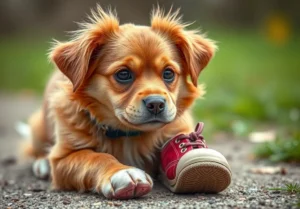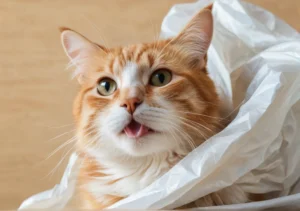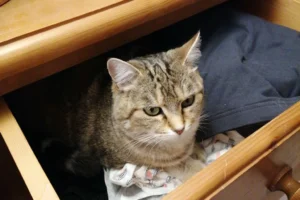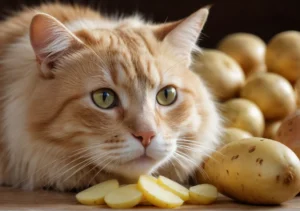Cats have a curious habit that leaves many cat lovers puzzled: munching on hair. Whether it’s your locks or their own, it’s not uncommon to see felines engaging in this strange behavior.
So why do cats eat hair? It’s primarily driven by instincts and individual behaviors, such as grooming habits, boredom, or even nutritional deficiencies. But this is just the tip of the iceberg—there’s a deep and fascinating story behind this furry obsession waiting to be uncovered down below!
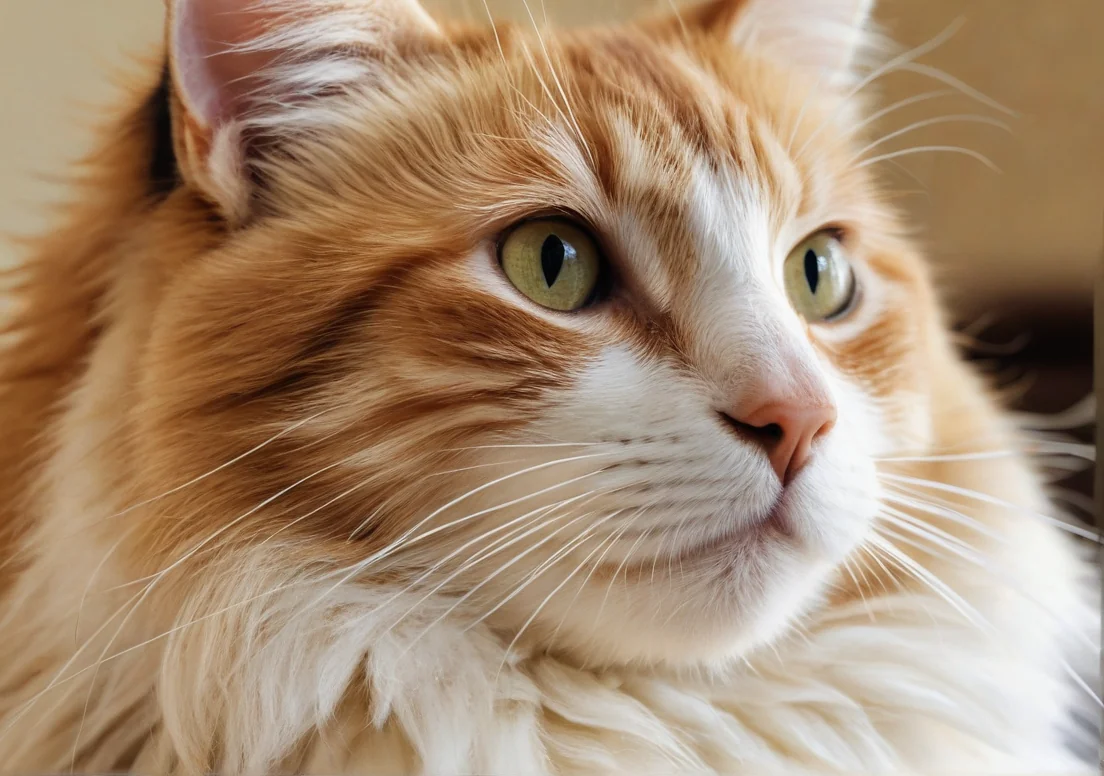
What causes cats to eat hair
Cats can be quirky creatures, and their hair-eating habit often leaves their owners scratching their heads. While it may seem bizarre, several reasons could be at play here.
One major factor is instinctual grooming. Cats are meticulous animals and can sometimes ingest hair while grooming themselves. If a cat has a habit of over-grooming, it may inadvertently consume more hair than usual, leading to a cycle of hair ingestion.
Another possibility is related to stress or anxiety. Similar to how some people chew their nails, a cat might nibble on hair when feeling anxious or bored. This behavior can often indicate that your kitty might be dealing with some emotional issues.
Interestingly, imitative behavior is also a potential cause. If a cat sees another cat or even a human engaging in similar behaviors, it might mimic them. For instance, kittens often copy their mothers and littermates, so if they observe anything resembling hair munching, they may just give it a try themselves.
Additionally, some cats may simply be curious. Just like toddlers exploring the world around them, cats are known for using their mouths to explore textures and tastes. They might find hair intriguing and start nibbling out of sheer curiosity.
In rare cases, underlying medical issues might be a factor. Conditions like Pica, a disorder where animals crave non-food items, can also cause hair-eating. If this behavior seems excessive or concerning, a trip to the vet is vital to rule out any health concerns.
Are certain breeds more prone to this behavior
Breed can definitely influence a cat’s behavior, including the tendency to eat hair. Some cat breeds, known for their particularly high energy and playful natures, may exhibit hair-eating more than others.
Siamese , for example, are notorious for their vocal tendencies and may exhibit stress-related behaviors, like hair chewing, if they don’t receive enough mental stimulation. Similarly, Bengals, known for their active and curious demeanor, might engage in hair-eating as a result of boredom.
On the other hand, more laid-back breeds like Persians may also fall into the trap of excessive grooming due to their long coats, leading to incidental hair consumption.
Genetics indeed play a role here. Certain traits passed through generations can predispose cats to higher levels of anxiety or stress, which might manifest as hair-eating. Here’s a quick rundown of some cat breeds that may show this behavior more frequently:
Siamese : High energy and vocal; can groom excessively when bored or anxious.
Bengal : Playful and active; curiosity might drive them to nibble on hair.
Oriental Shorthairs : Similar to Siamese, they require stimulation and might resort to hair eating if unsupervised.
Persians : Their grooming habits can lead them to inadvertently ingest hair, especially when stressed or out of routine.
Creating a stimulating environment with toys and interactive play can go a long way in redirecting this odd habit. Additionally, if you notice significant hair-eating, consult your vet for tailored advice and possible behavioral strategies.
How does boredom contribute to this habit
A cat’s natural curiosity can lead them to engage in some odd behaviors, like eating hair. When felines aren’t mentally or physically stimulated, they often resort to unconventional habits. Boredom can stem from a lack of interactive playtime, limited environment exploration, or even just being left alone too long.
Cats love to explore textures, and hair can be especially appealing. If your furry friend is cooped up with little to entertain them, they might start chewing on hair, whether it’s yours or their own. This can also be a method of seeking comfort or stress relief in an unstimulating environment. Moreover, boredom can create a cycle: the more a cat eats hair, the less engaged they become, which leads to more hair-chewing.
To keep your kitty occupied and diverted from this hair-eating habit, consider:
- Interactive toys: Get feather wands or laser pointers to promote active play.
- Environmental enrichment: Cat trees or scratching posts give them new areas to explore.
- Scheduled playtime: Dedicate time each day to engage your cat in fun activities.
Regularly rotating toys maintains their interest, making it less likely they’d resort to munching on anything undesirable.
Is hair-eating a sign of health issues
While occasional hair-chewing isn’t usually alarming, if your cat is consistently eating hair, it might signal underlying health issues. Medical concerns can arise from various sources, including:
- Gastrointestinal disorders: Conditions like inflammatory bowel disease or intestinal blockages can prompt cats to munch on hair in an attempt to self-soothe.
- Nutritional deficiencies: A diet lacking essential nutrients may lead cats to seek out hair, potentially due to a deficiency in fatty acids or other necessary vitamins.
- Stress and anxiety: Cats often turn to repetitive behaviors under stress, and hair-eating can be a coping mechanism alongside other behaviors like over-grooming.
If you spot signs like vomiting, diarrhea, or changes in appetite alongside hair-eating, it’s essential to consult with a vet. They may suggest dietary adjustments, behavioral therapy, or further diagnostic testing to get to the root of the issue.
Awareness of your cat’s behavior patterns is key, so make note of any related changes and consult your vet for tailored advice based on specific symptoms your cat is displaying. Keeping a journal of your cat’s habits can provide useful insights for vet appointments.
Can kittens develop this habit
Kittens are naturally curious little creatures, and their exploration often includes some rather unexpected behaviors, like eating hair. This tendency can surface early on because young cats are in a phase of experimentation. They explore textures and tastes, and hair can be intriguing—soft, fibrous, and sometimes scented with their owner’s familiar aroma.
This behavior might stem from instinctual habits, as kittens may engage in oral activities similar to suckling. Biting and chewing on various items are ways for them to navigate their world. If you notice your kitten gnawing on hair, it could also indicate a need for comfort or security.
While it’s not always a cause for concern, addressing this quirky habit early can save you from bigger issues down the line. Make sure to provide your kitten with plenty of stimulating toys and appropriate materials to chew on. Keeping their environment engaging helps steer them away from hair.
What can owners do to deter hair-eating
To tackle hair-eating head-on, consider these effective techniques:
Regular Grooming : Brush your cat frequently to minimize loose fur around the house that’s tempting to nibble.
Distraction : Offer interactive toys or puzzle feeders that keep your cat busy. Engaging them mentally can reduce their urge to munch on hair when boredom sets in.
Alternative Chews : Provide safe, cat-specific chews or soft toys. Cats love to chew, and giving them the right options can divert their attention.
Behavioral Training : Use commands to discourage hair-eating, paired with positive reinforcement when they engage with suitable toys instead.
Check for Stress : Examine your cat’s environment for stressors. A calm space can help reduce compulsive behaviors, so consider aspects like noise or territorial disputes that could be triggering.
Vet Consultation : If hair-eating persists, don’t hesitate to chat with your veterinarian. They can help rule out underlying health issues or suggest behavioral specialists if necessary.
While it’s normal for cats to enjoy some weird habits, keeping them safe is key. A little proactive effort can ensure your feline friend stays healthy and happy, steering clear of any hair-related mishaps.
Are there any health risks associated with hair consumption
Cats aren’t just randomly munching on hair; this behavior can pose some serious health risks. One primary concern is the potential for blockages in the gastrointestinal tract. Hair can clump together, forming a mass that obstructs the intestines. This can lead to vomiting, lethargy, and even more severe complications if not addressed quickly.
Additionally, having hair in their system might disrupt a cat’s natural digestion, possibly leading to diarrhea or chronic constipation. While some cats might occasionally eat hair without immediate problems, persistent behavior might indicate an underlying medical issue or stress.
Symptoms to watch for include:
- Lethargy: Less activity than usual.
- Vomiting: Especially if accompanied by hairballs.
- Loss of appetite: Not eating as they typically do.
- Difficulty passing stools: Straining or changes in bowel habits.
It’s crucial to keep an eye on your cat’s behavior. If hair consumption seems frequent or if any of these symptoms pop up, getting a vet’s opinion is a smart move to avoid any nasty surprises.
What role does stress play in hair consumption
Stress in cats can spring forth a range of compulsive behaviors—eating hair being one of them. Cats are creatures of habit, and any disturbance to their routine can lead to anxiety. This could stem from changes in their environment, like a new pet, moving homes, or even loud noises. When cats experience stress, they often look for ways to cope, and sometimes, that means turning to nibbling on hair for comfort.
Addressing this issue involves understanding the root causes of your cat’s stress. Here are some specific strategies to consider:
- Create a safe space: Make sure your cat has a quiet area where they can retreat.
- Routine matters: Try to maintain a consistent schedule for feeding, playtime, and interactions.
- Interactive play: Engage your cat with toys to keep their mind stimulated and distracted from stressors.
- Consider calming products: Options like pheromone diffusers or calming collars might help reduce anxiety.
If the hair consumption continues, even with stress management techniques in place, it’s wise to consult a veterinarian to rule out other underlying issues. Remember, your cat’s comfort is key for their happiness and health.
Interesting facts about cat behavior
Cats are known for their quirky habits and unique personalities, and their grooming behavior often includes eating hair, whether it’s their own or found around the house. It might seem odd, but this behavior can be linked to several natural instincts and health factors.
Many cats engage in self-grooming not just for cleanliness but also as a way to soothe themselves. This repetitive action releases endorphins, making them feel secure and relaxed. When they digest their own fur, it can end up in hairballs, but often they’ll also go after stray hairs on your clothes or furniture, treating it like a toy or a snack.
Curiously, cats have been known to eat hair if they’re feeling stressed or anxious; it can serve as a kind of comfort. Additionally, when a cat is feeling bored, chewing on hair can be an entertaining distraction. A cat’s sense of smell can lead them to your hair, finding it intriguing because it carries your scent – a comforting reminder of you!
Here’s a concise list of key facts about why cats might munch on hair:
- Grooming Instinct: Cats often groom themselves to maintain cleanliness, but sometimes they take it a step further.
- Stress Relief: Chewing or eating hair can be soothing for a cat under duress.
- Exploration: Cats are natural explorers and may chew on hair as part of their curiosity about their environment.
- Nutritional Deficiency: Cats might eat hair if they’re missing certain nutrients, particularly if they feel their diet isn’t meeting their needs.
- Self-Comfort: Similar to thumb-sucking in toddlers, some cats find chewing on hair relaxing.
If you notice your cat eating hair frequently, it might be worth checking if they’re stressed or if there’s some underlying issue. A trip to the vet could rule out any health problems or suggest dietary changes motivated by nutritional deficiencies.
Alex, a passionate animal lover, has experience in training and understanding animal behavior. As a proud pet parent to two dogs and three cats, he founded AnimalReport.net to share insights from animal experts and expand his knowledge of the animal kingdom.

